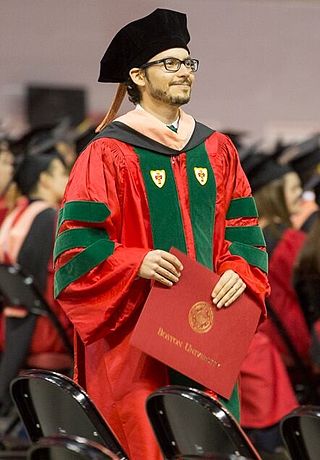The University Corporation for Atmospheric Research (UCAR) is a US nonprofit consortium of more than 100 colleges and universities providing research and training in the atmospheric and related sciences. UCAR manages the National Center for Atmospheric Research (NCAR) and provides additional services to strengthen and support research and education through its community programs. Its headquarters, in Boulder, Colorado, include NCAR's Mesa Laboratory, designed by I.M. Pei.

Many colleges and universities publish satirical journals, conventionally referred to as "humor magazines."
"Public Ivy" is an informal term that refers to public colleges and universities in the United States that are perceived to provide a collegiate experience on the level of Ivy League universities. There is no trademark for the term, and the list of schools associated with the classification has changed over time.

The Association of Research Libraries (ARL) is a nonprofit organization of 127 research libraries at comprehensive, research institutions in Canada and the United States. ARL member libraries make up a large portion of the academic and research library marketplace, spending $4 billion every year on information resources and actively engaging in the development of new models of scholarly communications.

National Institutes of Health Director's Pioneer Award is a research initiative first announced in 2004 designed to support individual scientists' biomedical research. The focus is specifically on "pioneering" research that is highly innovative and has a potential to produce paradigm shifting results. The awards, made annually from the National Institutes of Health common fund, are each worth $500,000 per year, or $2,500,000 for five years.
The Barristers' Ball is an annual event held at most law schools in common law countries such as the United States, Canada, Australia, and the United Kingdom. It is generally a formal/semi-formal affair, often near the end of the academic year, conducted by the institution's Student Bar Association as a school-wide gathering.
The Presidential Early Career Award for Scientists and Engineers (PECASE) is the highest honor bestowed by the United States federal government on outstanding scientists and engineers in the early stages of their independent research careers. The White House, following recommendations from participating agencies, confers the awards annually. To be eligible for a Presidential Award, an individual must be a U.S. citizen, national, or permanent resident. Some of the winning scientists and engineers receive up to a five-year research grant.

A Doctor of Public Health is a doctoral degree awarded in the field of Public Health. DrPH is an advanced and terminal degree that prepares its recipients for a career in advancing public health practice, leadership, research, teaching, or administration. The first DrPH degree was awarded by Harvard Medical School in 1911.
The Universities Research Association is a non-profit association of more than 90 research universities, primarily but not exclusively in the United States. It has members also in Japan, Italy, and in the United Kingdom. It was founded in 1965 at the behest of the President's Science Advisory Committee and the National Academy of Sciences to build and operate Fermilab, a National Accelerator Laboratory. Today, the mission of URA is "to establish and operate in the national interest unique laboratories and facilities for research, development, and education in the physical and biological sciences to expand the frontiers of knowledge, foster innovation, and promote the education of future generations of scientists."
The Searle Scholars Program is a career development award made annually to support 15 young faculty in biomedical research and chemistry at US universities and research centers. The goal of the award is to support to exceptional young scientists who are at the beginning of their independent research careers and are working in the fields of medicine, chemistry, and/or biological sciences.
There are various types of music schools in the United States. These include both pre-college and college-level schools, both private and public. College-level schools can be categorized as independent conservatories, or as music schools of larger universities or liberal arts colleges.

The Consortium of Universities for Global Health (CUGH), established in 2008, is a membership-based nonprofit organization focusing on global health. Its members are primarily institutions, although individuals can also become members. CUGH members currently include over 145 academic institutions and other organizations. CUGH was established in 2008 with funding from the Bill & Melinda Gates Foundation and The Rockefeller Foundation.
This page is based on this
Wikipedia article Text is available under the
CC BY-SA 4.0 license; additional terms may apply.
Images, videos and audio are available under their respective licenses.




